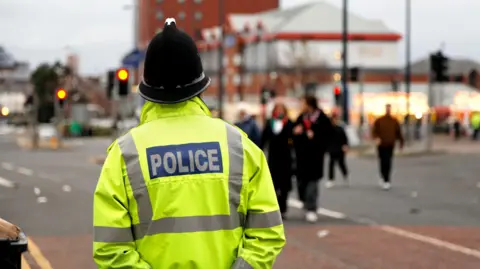[ad_1]
 Getty Images
Getty Images“Hooligans who wreak havoc on local communities” could face up to two years in jail under the plans to tackle anti-social behaviour, the government has said.
Police and councils in England and Wales will be able to apply for new “respect orders” to ban persistent offenders from town centres or from drinking in public places like High Streets and parks.
Breaching the orders will be a criminal offence, carrying a prison sentence of up to two years, with courts also able to issue unlimited fines or order offenders to carry out unpaid work.
However, civil liberties campaigners raised concerns the powers could be misused by police and criminalise homeless people.
The Home Office said police would also get stronger powers to deal with “the scourge of off-road bikes in public parks and dangerous e-scooters on pavements, street racing and cruising”.
Under the plans, officers would no longer have to issue a warning before seizing vehicles involved in anti-social behaviour.
The new respect orders, which were promised in Labour’s general election manifesto, will be introduced as part of an upcoming Crime and Policing Bill.
The government said they would partially replace existing civil injunction powers, with a “wider range of penalties” available to deal with breaches.
Offenders could also be forced to attend drug or alcohol treatment services, or anger management courses, to address the root cause of their behaviour.
Home Secretary Yvette Cooper said the orders were “effectively a modernised version” of the Asbo – anti-social behaviour orders which were first introduced by Tony Blair’s New Labour government in the 1990s.
Pressed over the difference between the two, she told BBC Breakfast police would get stronger powers to respond to anti-social behaviour with officers able to arrest persistent offenders.
She added that respect orders would not apply to children as “that didn’t work” in the past.
Asbos were scrapped in England and Wales by the Conservative-Liberal Democrat coalition government, with then-Home Secretary Theresa May arguing they were too bureaucratic and criminalised young people without rehabilitating offenders.
However, they are still used in Scotland and Northern Ireland.
Cooper was also challenged over whether police had the time and resources to deal with anti-social behaviour effectively, with more than one million incidents recorded last year.
She said the government was promising 13,000 more neighbourhood police and community support officers, who would be focused on targeting “the most prolific offenders”.
Liberal Democrat leader Sir Ed Davey said there needed to be more community police officers to prevent anti-social behaviour in the first place.
“I’m afraid I’m rather worried that this is more about press releases than actual real action to help our communities and people suffering from anti-social behaviour,” he said.
Akiko Hart, director of campaign group Liberty, said the new respect orders were “wholly unnecessary” and “near-identical” to existing powers.
“This expansion is especially concerning given we know from experience that these powers are routinely misused by the police, in particular to criminalise those experiencing homelessness,” she said.
“It’s important communities do feel safe, but dragging more people into the criminal justice system is not the way to do it.”
[ad_2]
Source link




